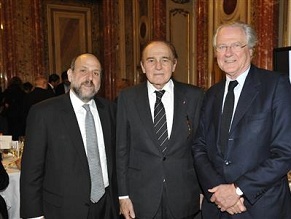|
World Jewish News

Samuel Pisar (C) with Eric de Rotschild (R) and Poland's Chief Rabbi Michael Schudrich at a dinner in Paris organised last week by the European Association of the Museum of the History of Jews in Poland (AEMPJ).
|
Museum dedicated to Poland’s 1000-year Jewish history to open next year in Warsaw
31.10.2012, Jews and Society The Museum of the History of Jews in Poland, scheduled to open in one year in Warsaw, will chronicle the 1000 years of Jewish life in Poland from the Middle Ages to current day, as part of a vast cultural and educational exhibition centre comprising eight state-of-the-art galleries.
Conceived in 1996 by the Institute of the Museum of the History of the Jews in Poland, the museum was built and financed by the Polish State on the former site of the Warsaw Ghetto, opposite a memorial to the slain heroes of the ghetto uprising.
The project represents a joint venture between the Polish Ministry for Culture and Heritage, the town of Warsaw, and the Jewish History Institute, as well as numerous other European and American organisations.
Throughout its long and active history, the Jewish community in Poland was different from any other in the world. It was universal. Before the creation of the State of Israel, it served as the heart of world Jewry, a sort of Israel in Exile,” stressed the writer and honorary ambassador Samuel Pisar, an escapee from the Auschwitz and Majdanek Nazi concentration camps, at a museum fundraiser held last week at the home of the Polish Ambassador in Paris, by the European Association of the Museum of the History of Jews in Poland (AEMPJ).
Some 130 people came to help raise funds for a permanent exhibition at the museum, including the Ambassador of Poland Tomasz Orlowski, the Ambassador of Israeli in France Yossi Gal, the Mayor of Varsovie Hanna Gronkiewicz-Waltz, the Chief Rabbi of France Gilles Bernheim, the Chief Rabbi of Poland Michael Schudrich, member of the honorary committee of the AEMPJ David de Rothschild, and the director Roman Polanski.
The organisation is charged with curating the museum, its permanent and temporary exhibitions, education and other programmes. To fund these initiatives, fundraising committees worldwide work to source sponsorship, donors and benefactors.
The museum will celebrate the contribution of the Jews in Poland spanning ten decades, a story which crosses beyond the barriers of Poland to the many places in which Polish Jews live today.
“Visitors from across the world will see, not only how our ancestors died, but also how they lived, worked and created. They will see our glory and our tragedy. They will especially see the wealth of Jewish civilisation which evolved over the centuries in the vast former lands of Poland,” added Pisar, a fellow honorary member of AEMPJ.
The exhibitions will document the first arrival of Jews in Poland in the 11th Century, the rights given to them by King Boleslaw in the 13th Century, the Golden Age of the 16th and 17th Centuries during the reign of King Kazimir, daily life in the towns and shtetls, but also the devastation of the pogroms and the fallout from the Holocaust.
For a new generation of Polish citizens, it will also try “to fulfil the duty of reporting the path of the Jewish people”, added Pisar.
A new Jewish community seems to have emerged in Poland today with numerous Polish retracing their roots and Jewish identities. The Jewish population, today estimated to comprise 20,000 people, could even reach 100,000 if you include the number of Jews who aren’t aware of their roots, those who simply don’t know as well as those who didn’t want to know after the Holocaust.
The museum is scheduled to open to the public on October 23, 2013.
EJP
|
|
